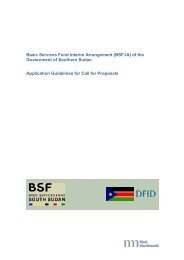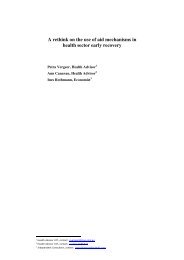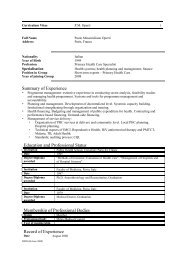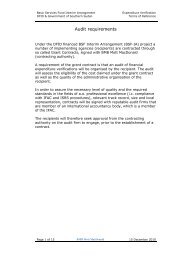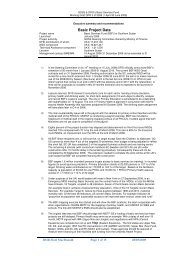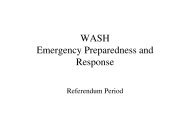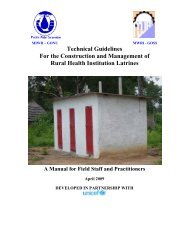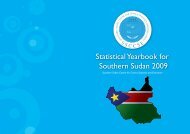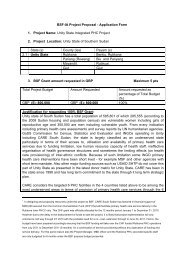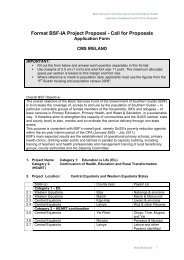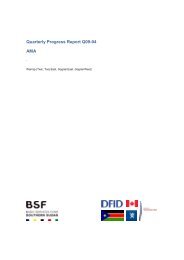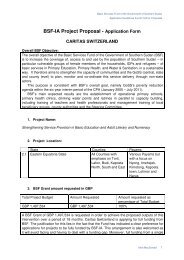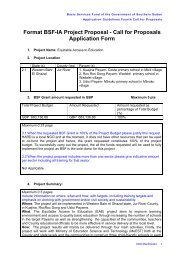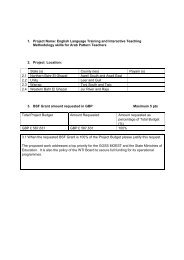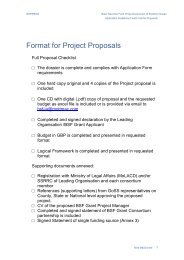IRD BSF-IA Proposal - Basic Services Fund SOUTH SUDAN
IRD BSF-IA Proposal - Basic Services Fund SOUTH SUDAN
IRD BSF-IA Proposal - Basic Services Fund SOUTH SUDAN
You also want an ePaper? Increase the reach of your titles
YUMPU automatically turns print PDFs into web optimized ePapers that Google loves.
with the CHD staff to improve Disease Surveillance, M&E, County Nursing, and Pharmacy<br />
Technician functions. The MCH Supervisor combines responsibilities of Maternal Health<br />
Coordinator of payam level and Nutrition Officer of the CHD, and does the same as PHC<br />
Supervisor, but specific towards TBAs and midwives. The MCH Superviser (Internationa) will<br />
work closely with JDF staff on nutrition project, ANC and Maternity Ward. The PM will also<br />
oversee the international Construction Manager/Water Sanitation Manager (CM/WSM) who<br />
will lead construction and rehabilitation activities, coordinate labor for activities, and be<br />
responsible for overall design per MoH guidelines. The CM/WSM will also work closely with<br />
the MWRI and local authorities to direct trainings for VWCs and pump mechanics and handle<br />
the water quality testing. The GoSS and Community Training Liaison (Sudanese) is<br />
responsible for community and local GoSS communication and mobilization in Duk County,<br />
and MoH and MWRI Directorate in Bor, and plans and coordinates meetings. A Sudanese<br />
Logistics Officer will work with the PM and CM/WSM for delivery of supplies and materials for<br />
distribution. The international JDF Project Manager (15 months) will also report to the PM and<br />
work closely with the PHC and MCH Supervisors and is responsible for coordination of project<br />
activities with the DLBC. All staff in Duk will report to and be supported by the team in Juba:<br />
the <strong>IRD</strong> Country Director, Finance Manager, Logistics Officer and Security Officer. The<br />
project will also receive technical assistance from an HQ based Technical Officer and an<br />
international Technical Consultant, to lead the assessments and base and end line surveys.<br />
8.4 Describe the partnership arrangements with government and other possible<br />
implementation partners (e.g. civil society) for effective project implementation.<br />
Since January 2009, <strong>IRD</strong> has worked closely with local government and traditional leaders<br />
throughout Duk’s eight payams. <strong>IRD</strong> has nurtured a strong relationship with the County<br />
Commissioner’s Office, the CHD and local authorities. These local stakeholders trust and<br />
recognize the results achieved under CHESS, while understanding that further <strong>BSF</strong> funding is<br />
an interdependent means for improved and sustainable service delivery. In planning for this<br />
project and future sustainability, project activities have been designed and prioritized in close<br />
coordination with the County Commissioner, local authorities, and state level MoH and MWRI<br />
representatives for Jonglei, and <strong>IRD</strong> has their commitment to support and maintain project<br />
investments. Under the proposed project, these established relationships will be enhanced<br />
through an increased mentoring approach in which <strong>IRD</strong> staff will provide close guidance for<br />
sector planning, implementation and monitoring. Project staff will be dedicated to providing<br />
service delivery actors with training and support to achieve even more tangible results, thus<br />
building community and local leader trust in service delivery maintenance and ownership.<br />
8.5 Describe the NGOs exit strategy (and therefore a government/civil society entrystrategy):<br />
Specify a training and capacity building plan to ensure that project<br />
activities be continued by government or civil society partners in a sustainable<br />
manner after project closure?<br />
<strong>IRD</strong> has attempted to realistically assess the complexity of the current situation of the health<br />
and water and sanitation systems of South Sudan, and particularly in Duk County, and<br />
understands that full sustainability can not be achieved within the life span of this project.<br />
Therefore, <strong>IRD</strong> will adhere to a strategy of step-by-step transition from fully dependant to a<br />
sustainable and functioning basic service delivery system from a long-term perspective. This<br />
project is still primarily focused on initial steps of the rebuilding of the health and water and<br />
sanitation system. <strong>IRD</strong> will invest in quality healthcare infrastructure, professional capacity of<br />
health and water and sanitation personnel, and introduction of managerial tools and systems.<br />
At the same time, local government, civil society and communities will gradually become more<br />
involved in management of these systems and accept more ownership. The next stage of the<br />
exit strategy in the long-term will be to hand over all managerial responsibilities to the CHD<br />
and persons in charge of health facilities, but with strong coordination, supervision and advice<br />
from <strong>IRD</strong>. However, the full exit cannot be possible until the government is able to finance the<br />
health system in full. Thus, <strong>IRD</strong> will use a mixed approach in its exit strategy based on<br />
gradual transition from a humanitarian aid project to one more focused on the provision of<br />
technical assistance. To ensure that the proposed initial stage of this exit strategy is<br />
International Relief and Development US <strong>Basic</strong> <strong>Services</strong> <strong>Fund</strong> and Mott MacDonald 9



